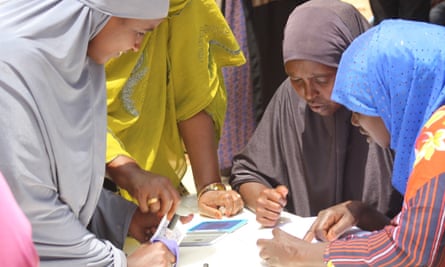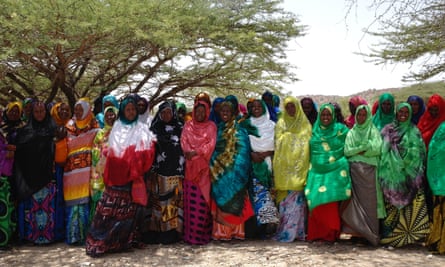For three years now, Somaliland, like much of East Africa, has experienced extreme drought. Drought that has become more and more severe, until earlier this year, with thousands on the brink of starvation, the government of Somaliland declared a national emergency.
The crisis should serve as a warning to the rest of the world to prepare – and prepare well – for extreme weather events, which are occurring with greater frequency and ferocity than ever before.
As the drought ravages the communities of Somaliland and its neighbours, hurricane Irma is making its destructive path through the Caribbean islands towards Florida. Countries in South Asia have been battling floods affecting more than 24 million people. Hurricane Harvey has wreaked havoc on the United States’ Gulf of Mexico. Sierra Leone has scrambled to respond to the deadly impacts of a landslide that took nearly 500 lives.
Needless to say, the impacts of these events are wide reaching. They extend beyond the obvious food, water and shelter shortages to the inevitable knock-on effects, such as mass migration within and across country borders, and the aggravation of pre-existing inequalities.
I’ve recently spent two weeks in the small, self-declared independent state in the northwest of Somalia, meeting women leading the humanitarian response to the disaster in their villages. Just hours outside Hargeisa, Somaliland’s tiny capital, I met women in drought-ravaged communities who have taken up leadership roles for the first time in their lives. These women are desperate to protect the lives of those most at risk in the ongoing crisis.

The impact of the drought on Somaliland’s communities has been extreme. The first two years were increasingly difficult, the women told me, but this last year has been the worst. After years of coping with dwindling water supplies – supplies required for business, for food preparation, for sanitation – it eventually evaporated almost entirely. Money ran out, animals died. With little to eat, whole communities became malnourished.
In Somaliland, those who were marginalised before the drought have experienced its greatest effects. In Saylabari, women have formed a collective to ensure that those most in need are the first to receive assistance when aid is distributed in their village.
And who are most affected? Women, they tell me. Women, who have long borne the brunt of a patriarchal system, and its brutish brother, poverty.
Singularly responsible for the care of their children, the stress that mothers have experienced in the drought has been severe. High rates of illiteracy among women who have been denied education means less access to information about what relief is on its way and who will have access to it.
Levels of domestic violence have increased significantly. Women whose husbands have left in search of alternative income are now responsible for providing for their families, as well as caring for them. Forced to forage for water in far off places, women are often raped on their journeys.
For those who migrate, the stories are worse. Over the past six months, people have left their homes in great numbers to search for water and for places their animals can graze on healthy vegetation. Leaving is a gamble –people leave in the hope that there is more sustenance further afield, but without any guarantee of finding it.
Somaliland’s experience of disaster is typical of any emergency insofar as it disproportionately affects women and those marginalised before the crisis. This is a well-recognised truth that should teach us an important lesson. The only way to prepare adequately for disasters of this scale is to address the deeply entrenched gender inequalities in access to resources and decision making.
One hundred kilometres from Saylabari and its women’s collective, a burgeoning women’s coalition have waged their own humanitarian response to the crisis in the village of Gorgeysa.

Their own community is unaffected by the drought, but the women’s coalition introduced a policy that every family in the community must take in two families. Chairwoman Ruun Essa Habane said, “We were receiving so many migrants – so many people who were searching for safety and for food and water. We had to work out how we could care for them.”
The collective pooled its resources, resources that the women had been saving over the three years that they have been working together. They used them to provide for those in their care. They donated clothes.
When I expressed my stunned (Australian) admiration, Essa Habane seemed surprised. “What else could we do?” she said. “We have the money.”
“The community cannot make decisions without us,” said Essa Habane. “We decided we wanted to support those affected by the drought and that was it.”
There is much that Australia could learn from the women of Somaliland and their response to the country’s protracted disaster. While the women in communities in Somaliland give up the little they have to support those who lack their basic needs, Australia struggles to respond humanely to the asylum seeker crisis that we have created.
Rather than responding with kindness to our fellow human beings, our politicians wallow in arguments about space and resources, postulating threats of terrorism and disseminating notions of greedy people jumping queues to grab “our” resources.
It’s worth considering how we might respond if our leadership wouldn’t primarily consist of white advantaged men, who struggle to see beyond the privilege that has always defined their lives, to empathise with those on the margins.
How long can Australia get away with this cruel and selfish response to those in need? Climate change is taking its toll – and it’s a toll that will eventually catch us up.
Extreme weather events are already leading to forced migration, in Somaliland and well beyond it, and in the years to come, millions of people will be on the move, in desperate search of food and water.
If we are to respond effectively to these impending crises – if we are, like the women of Gorgeysa and Saylabari, to ensure that nobody goes without, especially those most vulnerable – we must take action now to ensure that women are equally represented in leadership positions, and that they have the support to maintain them.

Female leaders create space for other women to take up leadership roles and to participate fully in decision making. They consistently make decisions that benefit whole communities, and ensure that everybody is considered and cared for.
At the end of every conversation I had with different women in Somaliland, they would ask me the same question: “What are things like for women in your country? What advice do you have for us as we strive for greater things – for presidency?”
All I could tell them was that in Australia, we’ve taken great steps forward but that the road ahead is long. I said that we could learn from them. That by supporting women’s leadership, perhaps we too, some day, might say, “What else could we do? We have the money.”
- Holly Miller is the head of communications at ActionAid Australia
